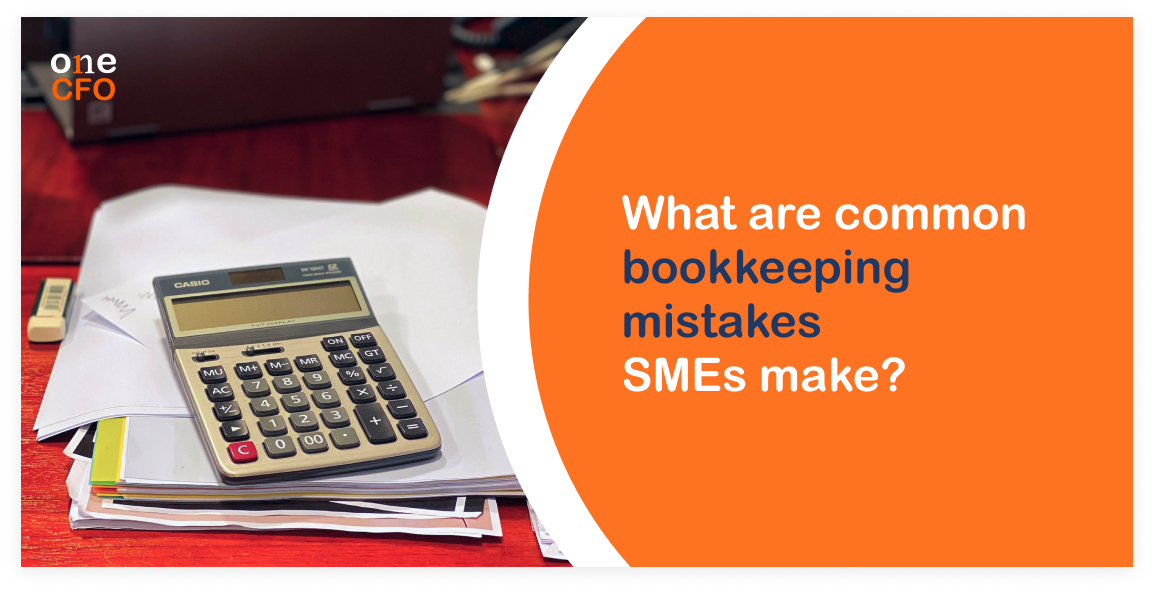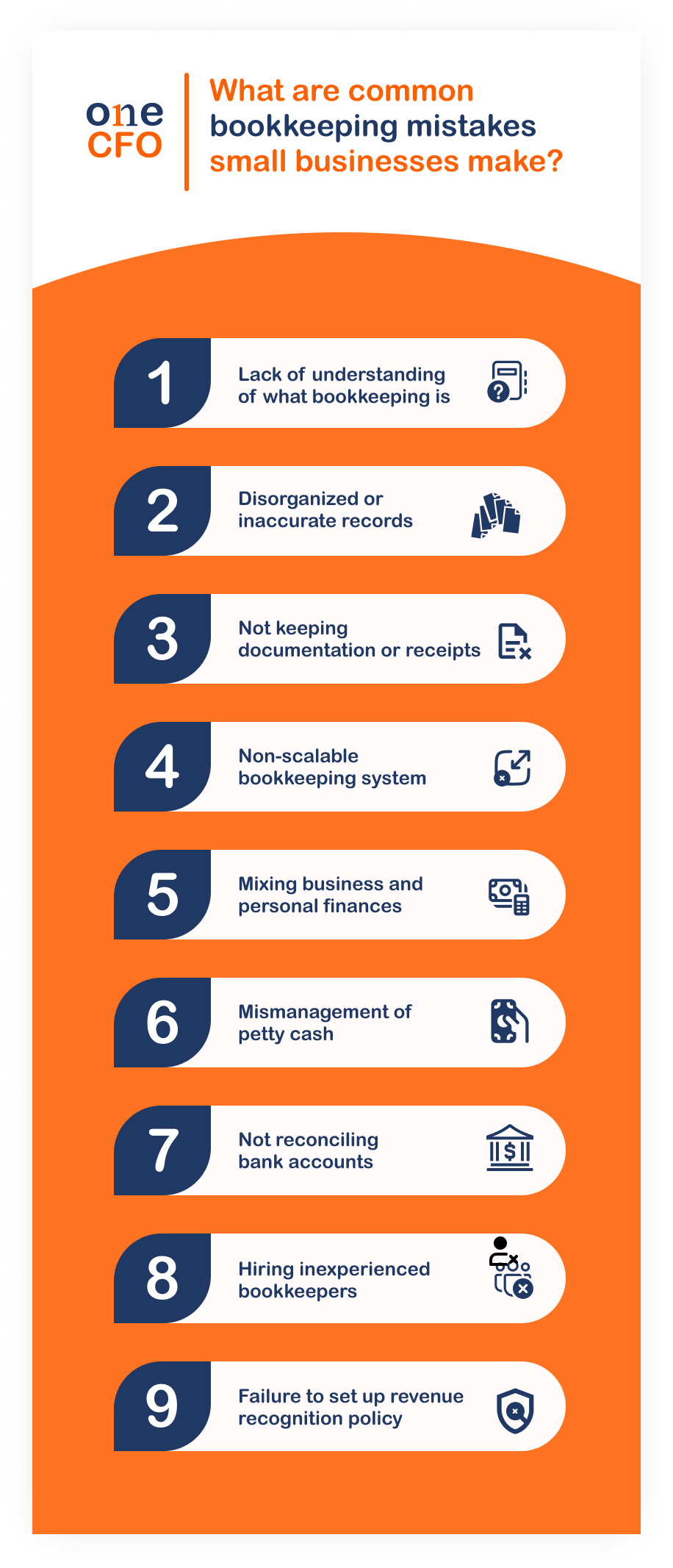
May 29, 2023 | 10:18 am
Table of Contents
Focusing on the business' growth and back-office operations is crucial as a small business
owner. These operations include bookkeeping, which when neglected, results in costly
mistakes - money and time and could even get you in trouble with the BIR.
But don't worry! We summarize common bookkeeping mistakes Filipino small business owners
make so you'll know what to avoid.
Some of these mistakes are not knowing what bookkeeping is, failure to keep accurate records
and documentation, and mismanagement of cash and bank accounts. It also includes needing the
proper bookkeeping system and hiring the right professional.
Read on as we explain how business owners make these bookkeeping mistakes. And as a bonus,
we also provide tips on how to do bookkeeping for a small business and prevent mistakes!
What are common bookkeeping mistakes?
Many small business owners must pay more attention to proper bookkeeping to prevent setbacks, wasted money and time. We have pinpointed common bookkeeping problems to avoid headaches and bumps in running your business.

Mistake #1: Lack of understanding of what bookkeeping is
The first mistake that small business owners make is not knowing what bookkeeping is or how
important it is in operating a business.
By definition, bookkeeping accurately tracks all
financial transactions in your business.
This means identifying, classifying, and recording each peso your business receives and
spends. This also includes updating and maintaining your financial records.
But how can bookkeeping help your business?
Proper bookkeeping makes tracking how money comes in and out of your business easier.
Without adequate bookkeeping, making wise financial decisions in growing the company or
allocating resources becomes challenging - much like going in blind!
Knowing the difference between bookkeeping and accounting functions is crucial, as it helps
you identify what kind of professional you should hire for your business.
There are a few overlaps between the two, but it’s important to note that accounting deals
with a higher level of financial analysis, interpretation, and document preparation. It also
includes ensuring your business always complies with the different tax regulations.
Mistake #2: Disorganized or inaccurate records
When things get overwhelming, you may start to overlook your recordkeeping activities, which leads to disorganized and inaccurate records. This mistake poses a big issue when making business decisions or when tax season occurs.
Not recording all transactions
A frequent error that leads to inaccurate records is tracking only some of your financial
transactions. Missing even the most minor sales or purchases will result in a significant
discrepancy in your records once piled up.
Not tracking your transactions regularly also makes it easy to forget how much money you
have received or spent. Additionally, you miss out on using
deductions that could lower your
income tax whenever you fail to record your expenses.
Miscategorization of transactions
Assigning categories for each financial transaction is essential in bookkeeping, and this is
often reflected in your chart
of accounts and even in the bookkeeping software you use.
When listing your financial transactions, be careful not to duplicate any categories or
mistakenly place an expense under the wrong one.
Likewise, if you transfer money across different channels or accounts, categorize it as
‘transfer’ and not as ‘income.’ Another typical error is recording payments to yourself as
an ‘expense’ rather than as a ‘withdrawal.’
Errors in data entry
Making human errors when entering data is also common in bookkeeping. Even the most minor
mistake, like missing a digit or placing a decimal point in the wrong place, can gravely
affect your business.
To address this, you can use double-entry bookkeeping when
recording your transactions,
which means recording each transaction twice as a debit and a credit.
Double-entry bookkeeping can help identify a recording error made by a bookkeeper. This
strategy aims to balance your books or ensure that the sum of your debits equals the sum of
your credits.
To prevent having disorganized or inaccurate records, you need to set up an effective
recordkeeping system in your business. There should be a regular schedule for updating and
checking your books.
Also, remember that you are required to register and submit your books to the
BIR every
taxable year. A business can maintain loose-leaf, computerized, or manual books of account.
Know the requirements and deadlines for submission of your books to avoid penalties.
With a professional’s guidance, you can also create standard operating procedures (SOPs) for
bookkeeping that you or your employees can easily follow.
Mistake #3: Not keeping documentation or receipts
Another common mistake small business owners make is not keeping documentation or receipts.
Even if your books are complete and updated, documentation is still needed to prove those
transactions happened.
Some supporting documents you should keep are invoices, official receipts, checks, pay
stubs, and paid bills.
You can leverage technology by scanning and uploading your documents to an online drive or
cloud accounting software. Make sure to back up all these data in a separate system in case
your primary files get lost or corrupted.
Even with digital copies, we still recommend storing and organizing your papers in a safe
area, which prevents you from scrambling to look for receipts when asked for a paper trail.
The BIR also advises keeping and preserving your accounting records for ten years in
case
you are audited.
If you’re unsure whether to save a receipt or throw it away, choose the safer option to keep
it. It’s better to have your documents and not need them rather than need them and not have
them.
Mistake #4: Non-scalable bookkeeping system

Seeing your business grow from scratch is a dream of most if not all, small business owners.
And when this happens, your operations systems and processes must grow with your business
too!
A mistake that small business owners make is neglecting to scale their bookkeeping and
accounting functions along with the business. This could lead to tons of unrecorded
financial data or missing important deadlines.
Even at the onset of a business, you should develop your bookkeeping and accounting
processes with growth in mind.
Remember, having the proper system while you start and business is still slow is better.
This way, when you get bigger, you can focus more on customer service and business growth
without bookkeeping becoming an afterthought.
One tip for developing a scalable bookkeeping system is to use tech-driven solutions to be
more efficient in entering, processing, and storing your data.
We recommend outsourcing if you’re already at the stage when you can’t keep up with
bookkeeping work. Delegate this task to a trusted provider for bookkeeping
services to
avoid the headache of setting up, hiring, and managing staff.
Mistake #5: Mixing your business and personal finances
Some business owners may think using personal money to cover business expenses, or vice
versa, is okay. After all, it’s their money, and they own the business, right?
However, mixing your business and personal finances could never be more wrong.
When you mix business and personal affairs, keeping track of business transactions becomes
even more complicated. It also poses problems once you file your taxes, avail tax
deductions, or process business loans.
To avoid this, you should open a business bank account right from the very start. This is
where you’ll keep the money that comes in and out of your business to separate it from
personal finances.
Having a business credit card for business expenses and building up your business credit
score is also helpful.
Allotting a budget for petty cash also prevents you from using personal money for small,
daily expenses.
In case you have to use your money to pay for a business expense, make sure that you record
this in your books and reimburse yourself using your business money.
Mistake #6: Mismanagement of petty cash
As explained previously, having petty cash on hand helps cover small
or unexpected expenses
in a business. However, business owners sometimes need to track where or how they use their
petty cash.
To keep your bookkeeping accurate, you must record all the times you use your petty cash.
One way to do this is by requiring everyone to log their expense whenever they need to use
petty cash. You should also reconcile all the receipts from these expenses and check these
against the remaining money.
By handling petty cash diligently, you better understand how much your business spends and
prevent any theft or fraudulent transactions.
Mistake #7: Not reconciling bank accounts
Reconciling your bank
accounts is another essential part of bookkeeping. This means checking
your book records and bank statements to ensure they match.
When you fail to reconcile your bank accounts, you also fail to notice any money
discrepancies in your business. Overspending, unpaid invoices, or theft can cause these
discrepancies.
Develop the habit of doing daily bank reconciliations to prevent significant business errors
and make better financial decisions. You should do reconciliations at least once a month to
properly track your transactions.
Mistake #8: Hiring inexperienced bookkeepers
Many small business owners consider hiring bookkeepers or accountants costly. Because of
this, they often try to DIY their bookkeeping or employ inexperienced staff. Instead of
saving resources, you’ll spend more time and money correcting mistakes.
But with the proper knowledge and expertise, hiring the right professional will minimize
accounting and bookkeeping errors.
Finances are no joke; we recommend hiring experienced and trusted professionals to handle
your bookkeeping. With the right people, you have more time to grow and scale your
business.
You’ll also have more peace of mind knowing you have someone who will help you keep track of
deadlines, avoid penalties, maximize tax deductions, and update you on significant changes.
But even when you outsource your finance functions, it’s still essential that you understand
the basics of bookkeeping and review your finances from time to time.
Mistake # 9: Failure to set up a revenue recognition policy
For companies doing accrual-basis accounting, a key
component is revenue recognition. Here,
revenue is recognized when the service or product is delivered and not necessarily when a
cash payment is received.
Some products take time to manufacture, or the services will take some time to be delivered.
It will be easier for companies to track income and expenses if a standard revenue
recognition process is set up.
Only when the product or service is rendered can revenue be recognized, even if payment
still needs to be settled.
However, the contract must be completely
delivered, and payment collection should be certain
and received within the same accounting period. Lastly, the contract's costs must be
included in the same period.
Using the revenue recognition principle also gives integrity to the financial reports since
revenue is a crucial measure of the company’s performance. This practice accurately reflects
the profit and loss on the income statement, giving credibility and reliability in making
financial projections.
Getting your bookkeeping right
Bookkeeping is a tedious task and, when not done right, will only lead to errors that could
cost your business tons of money and time.
Like this guide, plenty of resources are available to learn about proper bookkeeping.
We also recommend reading up on some best practices for bookkeeping for a
small business.
You can also consult a professional to answer your pressing questions.
Luckily, OneCFO is
here to provide you with the bookkeeping help you need and more! You will
have a dedicated bookkeeping professional and support for all your tax concerns, and we can
also handle your payroll processing or even serve as your CFO.
Are you excited to learn more? Contact us to know how we can
accelerate your business
growth.
Read our disclaimer here.